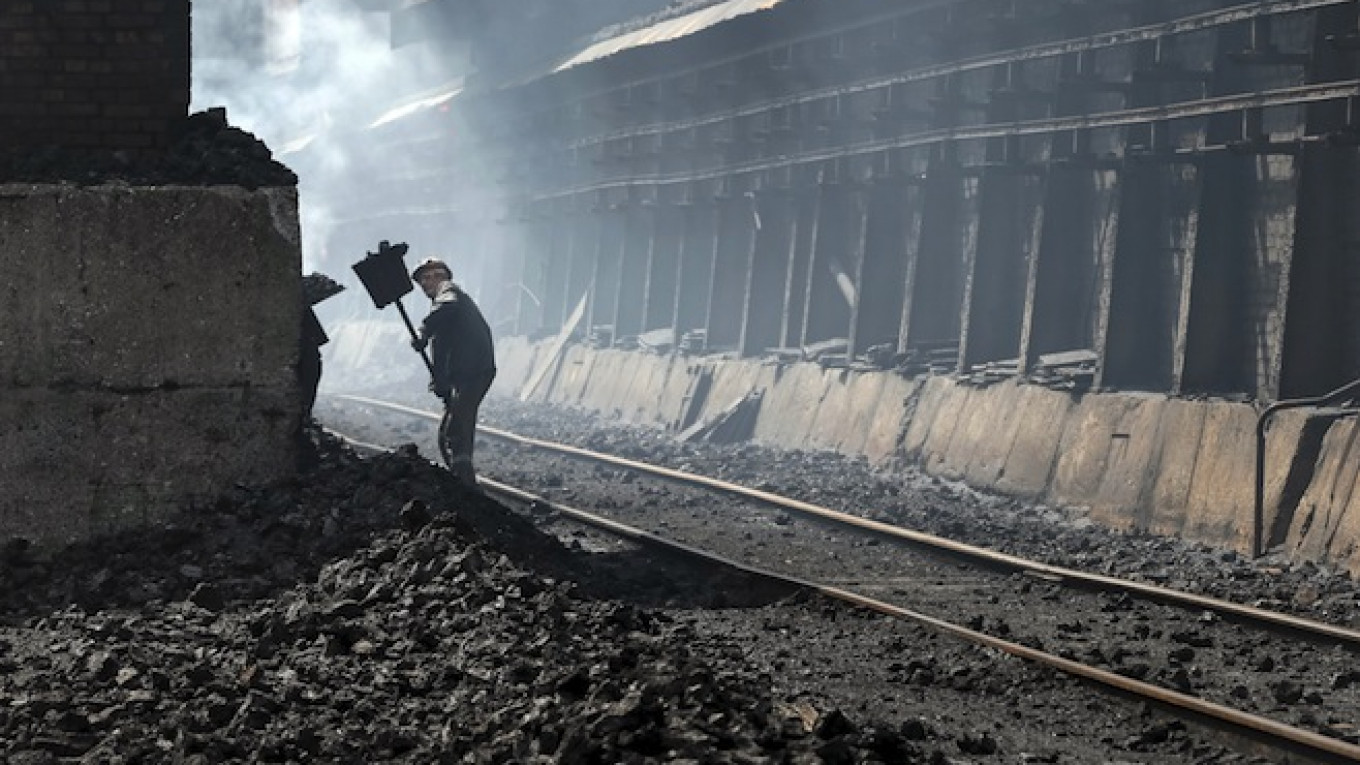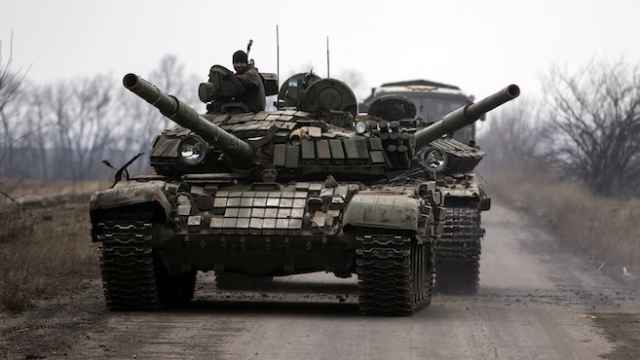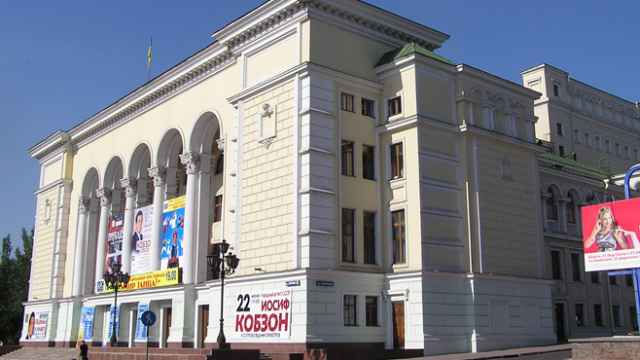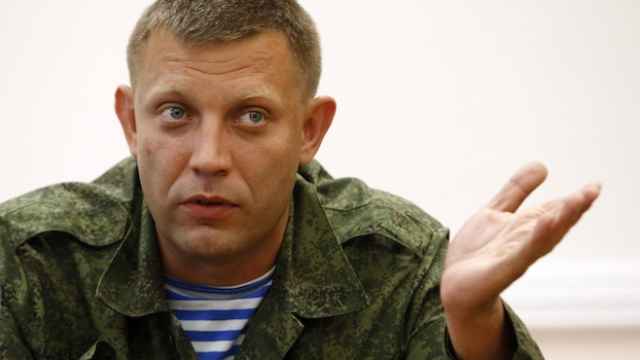AVDIYIVKA — Every working day, Dmitry passes out through the massive iron doors of a Soviet-built nuclear bomb shelter, mounts three flights of stairs and strides across the compound to put in an eight-hour shift keeping one of Europe's biggest coking plants on line.
That's if it's quiet. If shells are falling, he might turn back rather than risk the 150-meter dash across open ground.
Situated close to the "contact line" between Ukrainian government forces and well-armed rebels, the Avdiyivka Coking Plant outside the rebel-held regional capital, Donetsk, has been hit by about 230 rocket and artillery attacks since hostilities erupted over a year ago.
Dmitry, 48, is one of a remaining workforce of 2,000, many of whom have opted to spend their nights underground rather than hazard a trip back to their homes, which are also under threat of shelling, or already in ruins.
"After I came under shelling myself several times, I decided it was better to live here," he said. "In my village, there's not a single home left standing."
But his twilight existence goes further than that.
Like most of his colleagues, he does not want his surname published, and refuses to take sides in the war or say who he blames for the bombardment. With the front line so close, control of the plant could switch in a day.
The Kiev government squarely blames the Russian-backed rebels for the often indiscriminate shelling, which has killed at least one of the workers and wounded many more, though the rebels say different. The U.S. ambassador to the United Nations, Samantha Power, called the workers a model of Ukrainian "resilience" when she was in Kiev.
Debris of War
In a single attack on May 24, 70 projectiles rained down on the complex. But chief engineer Alexander Pasternak weighs his words carefully, saying only that "the factory itself was being deliberately targeted."
Bits of rockets and shells lie scattered around the 300-hectare complex, which houses an administrative center as well the production facilities. One tower is holed in its side from a missile strike. From the plant, the thud and crash of battle can be heard from the area of Donetsk's former international airport, just 10 kilometers (six miles) away. A sudden puff of black smoke indicates a distant missile strike.
The Avdiyivka plant, owned by industrial tycoon Rinat Akhmetov's Metinvest group, is one of Europe's biggest coking plants and provides the fuel for the steelmaking industry, itself a vital branch of Ukraine's economy.
Its pre-conflict output was 12,000-12,500 metric tons a day, but the war has disrupted supplies of coal and electricity, cutting production to around 5,300 tons, according to Pasternak.
The plant now mainly feeds the Ilyich and Azovstal steel plants in Mariupol, a port city in the southeast that is under government control but under constant military threat from the rebels.
For the plant to remain operational, the coke furnaces have to be kept running around the clock at a stable temperature of around 1,000 degrees Celsius — which means workers such as Dmitry have to keep going, even though the shells could be falling around them.
"If they [the furnaces] cool, then everything turns to ash, and we are finished," he said.
Nowhere to Go
But already the flames are sputtering.
"Many of the better people have left, taken their families away," Pasternak said. The best part of the work force has gone. A normal person can't keep their family here.
"Many people have nowhere else to go and have had to stay here, so they are angry. And they are angry against Ukraine because they are Ukrainians."
Irina and Svetlana are living in a tiny room adjoining their office on the eighth floor of the administrative block.
"I have been here since January. Where can I go?" said Svetlana. "I don't see any way out of this situation. I can't grab a gun myself and go and bring peace. Nobody is going to sit me down at the negotiating table."
Irina moved in a month later. "I got my mother out and then moved in here. Where else am I going to live when everything around is destroyed? Everything I have in life is here — in a single bag."
At least there is physical safety in the underground shelter, where Soviet-era posters offering safety and first aid advice evoke Cold War times, when every strategic Soviet plant had its own bomb-proof bunker.
Alexander shares a corner of the shelter with his wife, Yelena, where they have a microwave oven and an electric kettle, and watch movies together on a smartphone.
They, too, moved in in January, when Grad rockets began to hit the area where they lived in the town of Avdiyivka.
"We stayed in our house as long as we could. But then a mortar came down right next to us, and we decided not to wait for the next one to come through the window," Alexander said.
No one will hazard a guess as to when this half-life might end. Nobody here even mentions the Minsk agreements, brokered in February by the leaders of Russia, Ukraine, Germany and France, which were supposed to cement a cease-fire and usher in peace talks.
In fact, said Dmitry, "nobody actually remembers how all this started."
A Message from The Moscow Times:
Dear readers,
We are facing unprecedented challenges. Russia's Prosecutor General's Office has designated The Moscow Times as an "undesirable" organization, criminalizing our work and putting our staff at risk of prosecution. This follows our earlier unjust labeling as a "foreign agent."
These actions are direct attempts to silence independent journalism in Russia. The authorities claim our work "discredits the decisions of the Russian leadership." We see things differently: we strive to provide accurate, unbiased reporting on Russia.
We, the journalists of The Moscow Times, refuse to be silenced. But to continue our work, we need your help.
Your support, no matter how small, makes a world of difference. If you can, please support us monthly starting from just $2. It's quick to set up, and every contribution makes a significant impact.
By supporting The Moscow Times, you're defending open, independent journalism in the face of repression. Thank you for standing with us.
Remind me later.






